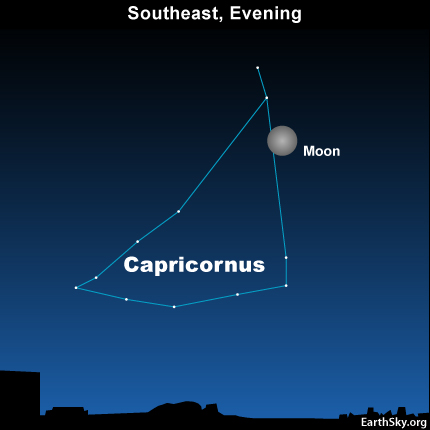Courtesy of EarthSky
A Clear Voice for Science
www.EarthSky.org

 To the casual observer, the moon looks full for up to two or three days in a row each month. Astronomically speaking, however, the full moon has no actual duration, but occurs at a well-defined instant. The moon is astronomically full when it stands 180 degrees opposite the sun in Earth’s sky. That happens this evening – on Sunday, July 25 – at 8:36 p.m. Central Time (9:36 p.m. Eastern Time, 7:36 p.m. Mountain Time and 6:36 p.m. Pacific Time).
To the casual observer, the moon looks full for up to two or three days in a row each month. Astronomically speaking, however, the full moon has no actual duration, but occurs at a well-defined instant. The moon is astronomically full when it stands 180 degrees opposite the sun in Earth’s sky. That happens this evening – on Sunday, July 25 – at 8:36 p.m. Central Time (9:36 p.m. Eastern Time, 7:36 p.m. Mountain Time and 6:36 p.m. Pacific Time).
For everyday reference, we can say the full moon lasts the whole night. After all, the moon’s face will be more than 99% illuminated all night long. What’s more, the moon will remain more or less opposite the sun throughout the night, so the moon will rise in the east around sunset, and will set in the west around sunrise. Any moon that lights up the nighttime from dusk until dawn can be regarded as the everyday person’s full moon.
This month, the full moon shines in front of the constellation Capricornus the Sea-goat, while the sun sits opposite the moon in front of the constellation Cancer the Crab. Next month, the August full moon will be found in front of the constellation Aquarius, whereas the sun will be back dropped by the constellation Leo.
Tonight presents the second full moon after the June 21 summer solstice. In North America, we often call the second full moon of the summer season the Grain Moon or the Green Corn Moon. Watch the full moon beam tonight, as it sails across the sky from dusk until dawn!
Written by Bruce McClure
Astronomy Picture of the Day from NASA/JPL
U.S. Naval Observator Astronomical Information center
The York County Astronomical Society
 Print This Post
Print This Post








